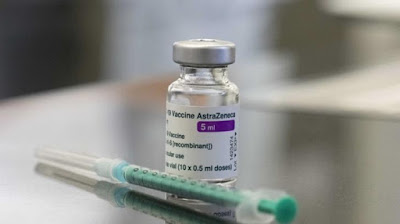Filenews 3 April 2021
The acute standoff between AstraZeneca and the European Union continues, with French European Affairs Minister Clement Bohn directly accusing the Anglo-Saxon pharmaceutical company of breaking promises, while arguing that while the EU continues to export hundreds of thousands of doses of vaccines, the UK is not exporting a single dose to the EU.
"Europe has decided to put its fist on the table," the French minister said, arguing that nationalist vaccine games cannot be played, with the aim of some countries showing that they are artificially ahead in the vaccination race.
"If we do not receive from AstraZeneca and the United Kingdom the vaccines that are ours, then AstraZeneca vaccines produced on European soil will never cross the Channel Strait," Mr Bon stressed.
While the World Health Organisation explicitly mentioned the need to speed up vaccinations in the EU, France's Minister for European Affairs stressed that while better efforts do indeed need to be made by EU Member States, the WHO should nevertheless be more concerned with the situation in China than with it in Europe.
Mr Bon reiterated that the European Commission's target of vaccinating 70% of European adult citizens by the end of the summer is achievable, with around EUR 350 million expected by June. doses of vaccines.
Faced with such an export control perspective, the UK and the EU have tried to find the right balance by announcing an agreement in principle that "in the short, medium and long term - create a win-win situation and expand the supply of vaccines for all our citizens." However, despite fierce criticism from the EU from the British press as a whole, it insists on targeting AstraZeneca. "We are in the post-Brexit era. We don't care what the British public thinks but what the European public thinks," said a European official.
And this statement identifies the reason for the ongoing war with the Anglo-Saxon pharmaceutical company. For European leaders facing an extremely difficult third wave of the pandemic that tests the strengths of national health systems and forces them to re-impose restrictive measures, at a time when some third countries are slowly but steadily preparing for a return to some form of normality, it is difficult to explain how most vaccines can be prepared in the EU but its own Member States are back in the vaccination race.
At the same time, a civil European conflict is under way, with Member States such as Austria, Slovenia and the Czech Republic trying to change the terms of the agreement on the distribution of vaccines collected in the European Commission's common basket.
The Portuguese Presidency of the Council of the EU has launched a plan to help the EU Member States most affected by the third and worst wave of the pandemic. Bulgaria, Croatia, Estonia, Latvia and Slovakia.
But Austrian Chancellor Sebastian Kurtz, Czech Prime Minister Andrej Babis and Slovenian Prime Minister Yanez Jansa, whose country will even light up the rotating presidency of the COUNCIL of the EU, refused to accept it - provoking the ire of all other EU member states.
Indeed, the attitude taken by Czech Andrei Babis is almost impossible to interpret by his counterparts, since under the Portuguese presidency's plan, his country would receive around 140,000 additional doses of vaccines.
All three European leaders are treated almost as personae non gratae by almost all the other Member States, as in order to avoid harsh criticism of their member states for their inability to speed up the vaccination programme, they directly blame Brussels, even though the negotiation on the purchase of vaccines was done primarily by the Member States, even within a committee whose vice-presidency Austria itself had.
Chaos continues with AstraZeneca vaccine
No end in Germany the uncertainty around the AstraZeneca vaccine in Germany. Following the recommendation of the Standing Committee on Vaccination (Stiko) on Tuesday to vaccinate only the over-60s, officials are now recommending that those who have already had the first dose with AstraZeneca do the second with another formulation. In Germany there are two other options: the BioNTech/Pfizer vaccine and that of Moderna.
Speaking to Der Spiegel magazine, Standing Committee on Vaccination Chairman Thomas Mertens said of the risks that may arise for those who have had both doses of the AstraZeneca vaccine that safe conclusions cannot yet be drawn, since very few citizens have completed the vaccination process: "I believe that those who have made the first dose with AstraZeneca should make the second with another , a similar vaccine. Animal experiments show that the immune system's response is the same. However, scientific consideration should be given to how effective it is to protect people after vaccination with two different preparations. I hope that we will soon have more information at our disposal."
Meanwhile, as revealed by the news website of the second ZDF public television programme, Chancellor Merkel and Chancellor Helge Brown had been informed as early as last Friday by the Standing Committee on Vaccination that vaccination of the under-60s with AstraZeneca should be stopped. However, it took four days for the health ministry to announce the decision. It should be noted that in the period from Friday to Tuesday almost 315,000 people were vaccinated with AstraZeneca without being aware that there are serious scientific objections to the preparation with which they are vaccinated.
Source: protothema.gr
